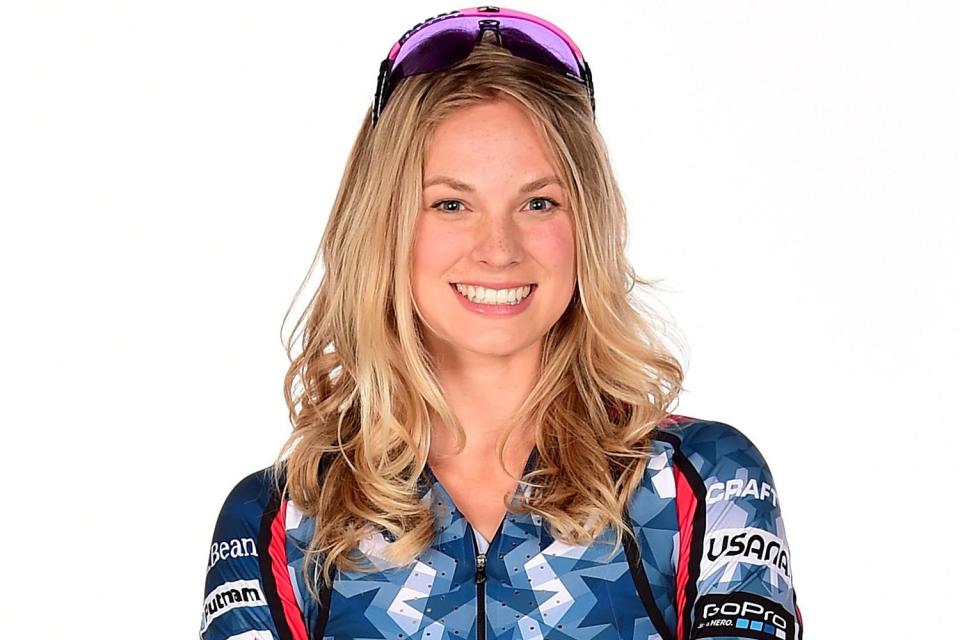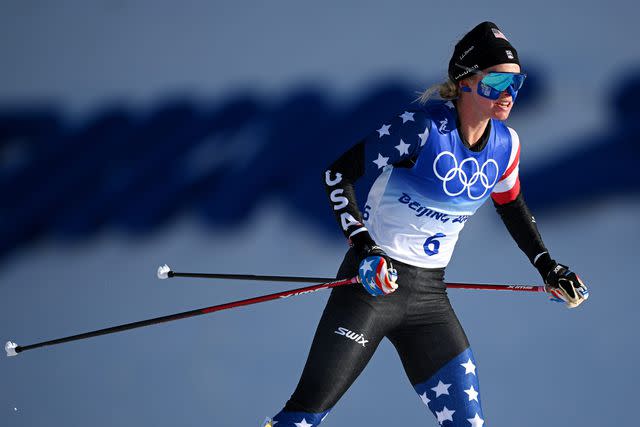Olympian Jessie Diggins Opens Up About Her Eating Disorder Relapse: ‘Relieving a Big Burden' (Exclusive)
The gold medalist cross-country skier sat down with PEOPLE to discuss her eating disorder and her desire to help others going through a similar experience

Jessie Diggins is speaking her truth in hopes of helping others.
The 32-year-old Olympic cross-country skier is opening up to PEOPLE about her journey, sharing that after 12 years in recovery from her eating disorder, she relapsed this summer.
“It was really tough,” Diggins tells PEOPLE about the realization that she relapsed. “I struggle with feeling pressure to be perfect, and most of that is pressure that I put on myself. A lot of different small stresses were stacking up. It's like if you're going on a hike and someone adds a little rock to your backpack, it's not a big deal, but if you keep adding and adding and adding rocks, suddenly that's a lot to walk around with every day. And it was just getting really heavy. And that was hard for me.”
For Diggins, recognizing that her eating disorder had resurfaced came from a change in her mood. “I just realized that I was sick and tired, and I realized that I didn't feel as strongly about it as I should,” the gold medalist says.
Related: The Women of Team USA Had Their Best Olympics in 20 Years in PyeongChang
“And so when I realized that I was using my eating disorder to not have to feel things, then I realized, 'Oh, it's back. And this is a problem.' And I like to wear my heart on my sleeve. I want to feel things. And when you use it to block out feeling pain, or anger, or stress or sadness, you also lose out on feeling joy and happiness, and love and all the good things.”

When it came to telling her husband, family and friends, Diggins admits it was “heartbreaking.”
“It was hard to tell my husband and my parents simply because you don't want to cause people who you love, who love you, pain and stress and worry,” she explains to PEOPLE. “But I also knew I needed to tell them; they want to be there for me and I need to let them in, and it almost instantly relieved a pretty big burden from my shoulders. It's like they each reached into the backpack and took out a bunch of rocks and were able to carry them for me while I worked on figuring out how to throw them away.”
While she is grateful for all of the support she has received, Diggins is especially appreciative of her coaches’ empathy. “They all responded in a really great way and I think that's really important to talk about because instead of panicking about what this means, they all just said, ‘I'm sorry that is happening, but we really care about you as a person first. Ski racing comes second, and all we want is for you to live a long, happy, healthy life, so that's the priority.’ ”
Related: Team USA's Jessie Diggins Receives Cross Country 30km Silver Medal During Closing Ceremony
Diggins feels the fear and vulnerability that come with announcing her relapse, but knows sharing the news with the world is what is best for her.
“With social media, you get to tell your story in a way where a lot of people hear it so I'm in this really unique position, at this point in my life, where I can help people and I can make it okay to talk about things,” the cross-country skier tells PEOPLE.

“If I can come out and have the courage to say, ‘Yeah, I'm struggling with this, I'm working on this and I'm leaning on my support team,’ then that can maybe make it okay for other people to do the same."
Diggins adds that between her 2020 book Brave Enough and sharing her eating disorder story publicly in 2018, she received letters and notes thanking her for speaking openly. "I kept a lot of the letters and they're really moving, and so having proof that this does help people and that making it okay to talk about is something that works — that also gives me a lot of courage back.”
Thinking about the future of her career is a “one step at a time” process for Diggins. “I'm only going to be training and racing if it's the right thing for me because my lifelong goal is to be 80 years old skiing the Birkies with my grandkids, and that's what I want more than racing right now or training right now,” the Olympian says.
“That said, right now I have gotten to a much, much, much better place, and so I am training and planning to come to our team camp in the fall. I really would love to race because that is something that brings me a lot of joy and a lot of meaning.”
Diggins hopes sharing her story will help others realize that “[an eating disorder] shouldn’t be something that is shameful.” The skier knows firsthand that eating disorder recovery is not “this perfect linear line,” but wants people going through a similar experience to trust that hard work pays off.
“It's almost more like trying to train for cross-country skiing. You do all this work, and you might not instantly see results. It might be that you have to chip away at it for a while before you see that progress. But knowing that doing that work, that emotional, that mental work, it is going somewhere.”
If you or someone you know is struggling with an eating disorder, please go to NationalEatingDisorders.org.
For more People news, make sure to sign up for our newsletter!
Read the original article on People.


